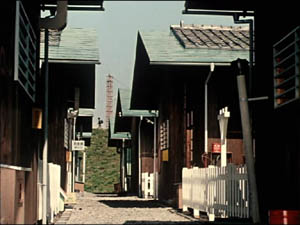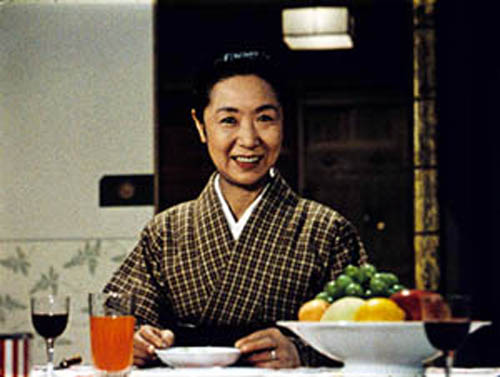I Wrote a Book, But…; or, What Did the Professor Forget?
Thursday | November 9, 2006 open printable version
open printable version
My 1988 book, Ozu and the Poetics of Cinema, is available again, I’m happy to report. There’s a little backstory, probably of interest only to those who follow the zigzags of academic publishing.
Around 1990 the British Film Institute declared the book out of print. The US copublisher, Princeton University Press, agreed to keep it in print under two conditions.
First, I would have to pay for the cleaning of the preprint material (the sheets of plastic on which the master copies of the pages were printed). Cost: $1000. Second, I would receive no royalties. I agreed to the terms, since I wanted to have this book, for all its faults, available.
So for about a decade, the book was still out there. I enjoyed the anecdotal value of getting royalty statements reading: Your royalty payment is $000.00. Still, all those decimal places sort of rubbed it in. Wouldn’t $0 have been enough?
As Ozu’s centenary approached in 2003, I contacted Princeton to alert them. Maybe there’d be a bump of interest in Ozu, and they might want to do another printing. But the Press replied that, um, they had some months before declared their edition out of print.
Publishers have a habit of not telling authors about decisions like this. There’s no fun way to announce that a book is orphaned, or maybe slain. Then too there’s the somewhat awkward matter of returning a piece of intellectual property that might become an asset some day. Anyhow, Jerry Bruckheimer wasn’t likely to pick up the movie rights to Ozu and the Poetics of Cinema, and so after regaining copyright control, I took the book on the road.
No surprise: Other publishers were not crazy about reprinting a big fat book with lots of pictures, published fifteen years before and probably bought by every soul who might ever want a copy. I’d hoped that a book on very likely the greatest film director who ever lived might be worth keeping around. But no, alas.
Every month or so, as the Ozu touring program roamed greater North America in 2003 and 2004, a fan would email asking me to sell a copy of the book. Web booksellers were demanding up to $600. The thought of selling one to a book dealer at a jacked-up price, perhaps with a signature affixed, did cross my mind, but I had only two copies of my own.
Eventually I learned of the publishing program launched by the University of Michigan Center for Japanese Studies. The Center had begun posting out-of-print books on Japanese cinema online. I contacted Markus Nornes, who generously sponsored and oversaw the project.
I learn from a correspondent that the book is now available in pdf form online.
Now you can read the book, and can even buy a print-on-demand copy if you want. (I look forward to the $000.00 checks from Ann Arbor.) The downside: The 500-plus pictures range from tolerable to terrible. I also planned to write an introduction with updates and corrections, and I still hope to do that. There’s even talk about replacing some stills, perhaps with color frames.

So if you’re interested in Ozu, Japanese film history, or the poetics of cinema, you might want to check this out. Of course you can instead crack your piggy bank and order the single copy of the original I’ve found on what our President calls the Internets.
If I were in an Ozu film, I’d probably now emit a sigh mixing satisfaction and resignation. Then I’d reach for a beer. Or at least an orange drink. No, a beer.
Update, November 10: I’d thought that print-on-demand copies would be available, but Carsten Czarnecki points out that the Center site doesn’t seem to indicate that. I’ll check further.
Update #2, same day: Our keen-eyed web tsarina Meg has found still other copies of the original book available, at prices starting at $118.95, here. Please remit 10 % finder’s fee to her.
Update #3, November 11: Markus tells me that we hope eventually to offer print-on-demand copies, but the technology doesn’t yet meet the Center’s standards. Good! We want nice-looking images, when we can finally get ’em.














